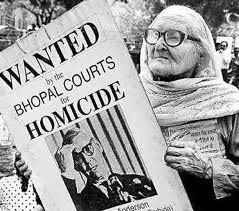This is the story of Warren Anderson, CEO of Union Carbide Corporation at the time of the disaster, and still wanted in India on the criminal charge of Culpable Homicide.
THE STRANGE VOYAGE OF WARREN ANDERSON
Part 1.
Anderson flew to Bhopal on December 7, was arrested and held at Carbide’s luxury lakeside guest house. Hours later the press camped at the front gate learned he had left Bhopal. No one saw him go, but according to a reporter who was there, the back gate leading to the lake was off its hinges. When the Chief Minister was asked if Anderson had been rowed across, his only reply was an enigmatic smile. Here, in a fictional piece, we speculate about what might have been passing through Warren Anderson’s mind on that strange trip.
As the boat pulled away, with sunset beginning to settle on the water, you must still not have been sure that you were going to escape. This was the craziest thing yet in a nightmare that had begun the day you were ill and they woke you with news that your Indian plant had gone rogue.
‘We’re afraid there were deaths.’
‘How many deaths?’
‘Ten or twelve, we think.’
By 6am the reports said 50, then the figures spiralled beyond counting.
‘I must go there,’ you said.
Your wife was adamant that you should not. ‘You’ve had a bad fever.Send Jackson. Warren, what if those Indians get mad and lock you up?’
‘They won’t, Lil.’
We know you were pretty confident of that because you had sought and received assurances from a shaken Indian government.
Lily wanted you to stay home in bed but you drove to Danbury. Each of the 57 minutes it took seemed to last an hour. Then before the cameras of the world’s press you took ‘moral responsibility’ for the thing that had happened in Bhopal. It was the idea of a PR guy, Peter Hargy-something. The lawyers predictably were most unhappy about it, but as the PR guy said, ‘moral isn’t the same as legal’.
Two days ago in New York, we hear that the lawyers were still trying to talk you out of going to Bhopal.
‘Bad idea, sir. Could be read as an admission of guilt.’
‘It’ll make a good impression if I say something in Indian. Something like, I’m so sorry for what happened.’
‘Don’t say sorry,’ the lawyers will have chorused. ‘Go ahead, express sympathy all you like but don’t say sorry because I’m sorry sounds like you’re to blame.’
As the plane landed you looked out to see police cars drawn up on the tarmac.
‘Nice of them to give us an escort,’ you said, but never got to recite the decent words you’d rehearsed.
You can read the complete Bhopal Marathon publication online here



